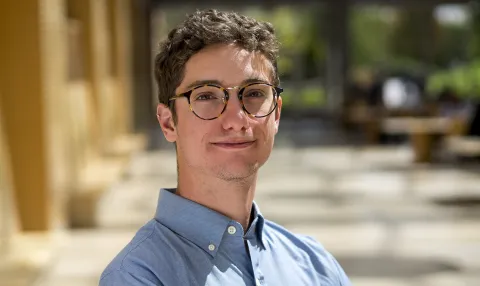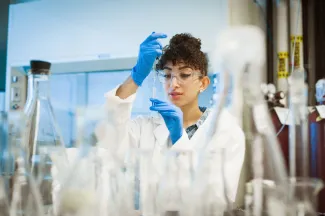"I draw inspiration from the brilliance of nature. The patterns of nature aren’t just beautiful to observe, they also have logic to learn from."

Jackson Herron
- Degree:
- Bachelor of Applied Science
- Grad year: 2019
- Program:
- Campus: Vancouver
Raised in Park City, Utah, USA, I developed an appreciation for the Earth and wild spaces. In 2014 I received news that I was selected as an International Leader of Tomorrow Award scholar to study at UBC. Throughout my time here I have been deeply inspired by the international community. I have completed my bachelor studies in chemical and biological engineering, and during that time participated in the co-op program and studied abroad at the Technical University of Denmark. During my years at UBC, my passion for sustainable technology has grown, leading me to get involved with Engineers for a Sustainable World to strengthen networks of sustainability in the faculty. In my final semester, I co-coordinated a student directed seminar focused on climate change ¬mitigation for engineers: APSC 498T – Decarbonization Technology and Policy.
Why did you choose engineering?
Engineers have a way of thinking about the world that I have always admired. They apply a physical understanding of how the world works to build systems that meet the needs of society. How can we construct buildings to withstand earthquakes? How can we derive energy from renewable resources? These questions of applied science are instinctual to me, and so engineering was a clear choice when it came to choosing a profession. Great engineer role models also inspired me, including my mother and high school physics teacher.
What have you learned in engineering that is most valuable?
The most valuable thing I have learned in my engineering education is how to approach complex problems. The discipline has taught me to analyze a problem systematically by breaking it down into parts, to model relationships between those parts to predict outcomes, and eventually to arrive at a set of solutions. Sometimes the solution may require reworking the system entirely because it is flawed by design. I have also learned the importance of taking uncertainty into account, because all solutions are produced from a limited set of knowledge. With this in mind, it is critically important identify and plan for risks in case of failed analysis. Lastly, I have learned that complex problem solving takes the strength of a team, and that effective teamwork requires trust and mutual respect.
How are you applying the skills you learned through your studies at UBC?
One of the most self-directed and enjoyable ways I have applied my studies at UBC is by organizing a student-directed seminar in my final year: APSC 498T – Decarbonization Technology and Policy. The seminar, which I co-coordinated with my peer Ashna Misra, explored climate change mitigation strategy from economic, political, social and technological frameworks. Of the 10 students that took the course, seven were in engineering, two in Global Resource Systems, and one in history. We were able to integrate our engineering knowledge to discuss technological solutions for decarbonization, but also break down barriers of techno-optimism and the separation between engineering and the political, economic and social factors that shape technology. Directing and participating in this course gave me a holistic understanding of decarbonization, and how to look at technical solutions with a nuanced view and long-term vision.
Where do you find your inspiration?
I draw inspiration from the brilliance of nature. The patterns of nature aren’t just beautiful to observe, they also have logic to learn from. In a thriving ecosystem there isn’t waste or overuse; each part of the system is in delicate balance and interdependence. This balance evolves through creative mistakes and adaptation and never ceases to amaze me. I am inspired to both emulate and protect nature.
What are your plans for the future?
My immediate plan is to move to San Francisco to live with my partner. Being from the United States, I feel a sense of responsibility to go back and get involved. I was particularly demoralized by the Trump Administration’s decision to withdraw from the Paris Agreement, so I plan to get involved in climate activism. In the next few years I plan to explore the workforce before going to graduate school. My intention is to study systems engineering, focussing on energy systems and the clean energy transition. I have particular interest in energy storage for renewable energy systems, knowing this is an important technology and an excellent way to apply my chemical engineering background. Long-term I hope to build a career in clean technology that contributes to global decarbonization by mid-century. Conveniently, this goal will fall at the end of my 30+ year career!



